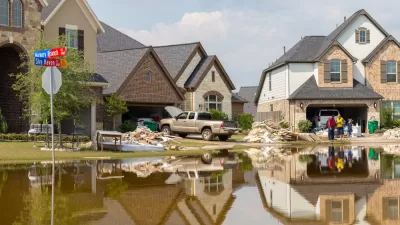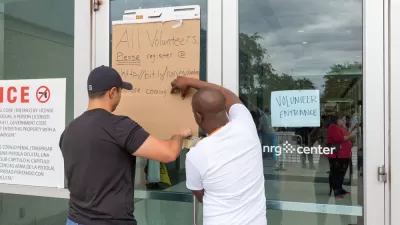The city’s resilience plan seeks to identify shocks and stresses while fostering equity and community.

Mark Wessel reports on Resilient Chicago, a plan that focuses on the city’s neighborhoods, infrastructure, and community preparedness. It keeps resilience efforts moving forward after the Rockefeller Foundation announced it would not continue the 100 Resilient Cities initiative.
The Resilient Chicago planning process started in 2016 by seeking public input to identify the city’s most pressing challenges: neighborhood disparities, crime and violence, critical infrastructure, and community preparedness. The plan highlights the Neighborhood Opportunity Fund and equitable transit-oriented development as effective strategies to address disparities, notes Wessel.
Wessel writes that the initiative’s future is unclear as the city prepares to bring on a new mayor. "But at least for the moment, [Stefan] Schaffer remains focused on what he feels is the most pressing task at hand: addressing the key, underlying disparities that cause challenges to Chicago’s most vulnerable residents, such as poverty rate, housing cost burden, and neighborhood flooding, among others."
FULL STORY: Chicago’s Resiliency Plan Aims for Equity

Maui's Vacation Rental Debate Turns Ugly
Verbal attacks, misinformation campaigns and fistfights plague a high-stakes debate to convert thousands of vacation rentals into long-term housing.

Planetizen Federal Action Tracker
A weekly monitor of how Trump’s orders and actions are impacting planners and planning in America.

In Urban Planning, AI Prompting Could be the New Design Thinking
Creativity has long been key to great urban design. What if we see AI as our new creative partner?

King County Supportive Housing Program Offers Hope for Unhoused Residents
The county is taking a ‘Housing First’ approach that prioritizes getting people into housing, then offering wraparound supportive services.

Researchers Use AI to Get Clearer Picture of US Housing
Analysts are using artificial intelligence to supercharge their research by allowing them to comb through data faster. Though these AI tools can be error prone, they save time and housing researchers are optimistic about the future.

Making Shared Micromobility More Inclusive
Cities and shared mobility system operators can do more to include people with disabilities in planning and operations, per a new report.
Urban Design for Planners 1: Software Tools
This six-course series explores essential urban design concepts using open source software and equips planners with the tools they need to participate fully in the urban design process.
Planning for Universal Design
Learn the tools for implementing Universal Design in planning regulations.
planning NEXT
Appalachian Highlands Housing Partners
Mpact (founded as Rail~Volution)
City of Camden Redevelopment Agency
City of Astoria
City of Portland
City of Laramie





























